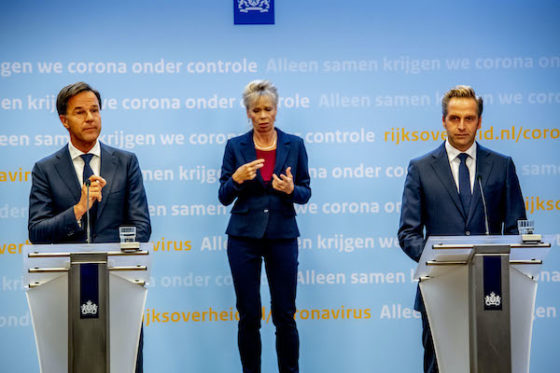Clubs to remain shut, but think about all the things we can do, Dutch PM tells reporters


Rather than focus on all the things we cannot do, we should be focusing on the things we can do despite coronavirus, prime minister Mark Rutte told a press conference about the government’s approach to dealing with Covid-19 on Tuesday evening.
The situation in the Netherlands, Rutte said, is stable, in terms of new infections, hospital and intensive care admissions. ‘In some countries, where the virus seemed to be under control, the figures have exploded,’ he said. ‘This has to be a warning for us.’
However, the situation is not so positive that night clubs and discos can reopen their doors, Rutte said. Clubs had been told that their situation would be looked at again by September 1. However, people in their 20s currently account for by far the most cases of coronavirus.
Now the virus is relatively under control, it has become more invisible, Rutte said. Nevertheless, people have a relatively large amount of freedom, he said.
‘We have never stopped people from travelling more than 1.5 kilometres away from their home, or required them to have a stamp from the mayor to move,’ Rutte said. ‘If you’ve had a hard day at work or studying, you can go to the cinema, drink a beer or go for dinner with friends.’
Nevertheless, ‘there is not one truth in determining how to deal with the virus,’ Rutte said. ‘We work on the basis of what we know.’ This, the prime minister said, is why he and health minister Hugo de Jonge will hold an online meeting with whoever wants to take part next week, to listen to critical points of view and to gather ideas and suggestions.
Testing
De Jonge told reporters that testing labs are finding it difficult to keep up with demand, and urged only people who have symptoms to book a test. The pressure will go up in the coming months as winter approaches, he said, and testing capacity is being increased accordingly.
Nevertheless, it could be that a situation will arise in which officials have to make choices about who can be tested. ‘If demand outstrips testing capacity, we will have to introduce priorities,’ he said.
The OMT has been asked to look at what approach, such as testing teachers first, would have the most impact. ‘But we are not in this position yet,’ De Jonge said.
Regional approach
The regional approach will be refined further in the coming period and local situations will be highlighted on the coronavirus dashboard so that every region has its own coronavirus status, De Jonge said.
Talks with outside experts have shown that the approach to dealing with the virus needs to be much more focused, he said. ‘We need to be much more precise about the measures and we need to improve the communication so we explain why a measure is required in one place but not in another.’
‘We have got to be more visible about what measures are being carried out in what areas.’
Thank you for donating to DutchNews.nl.
We could not provide the Dutch News service, and keep it free of charge, without the generous support of our readers. Your donations allow us to report on issues you tell us matter, and provide you with a summary of the most important Dutch news each day.
Make a donation